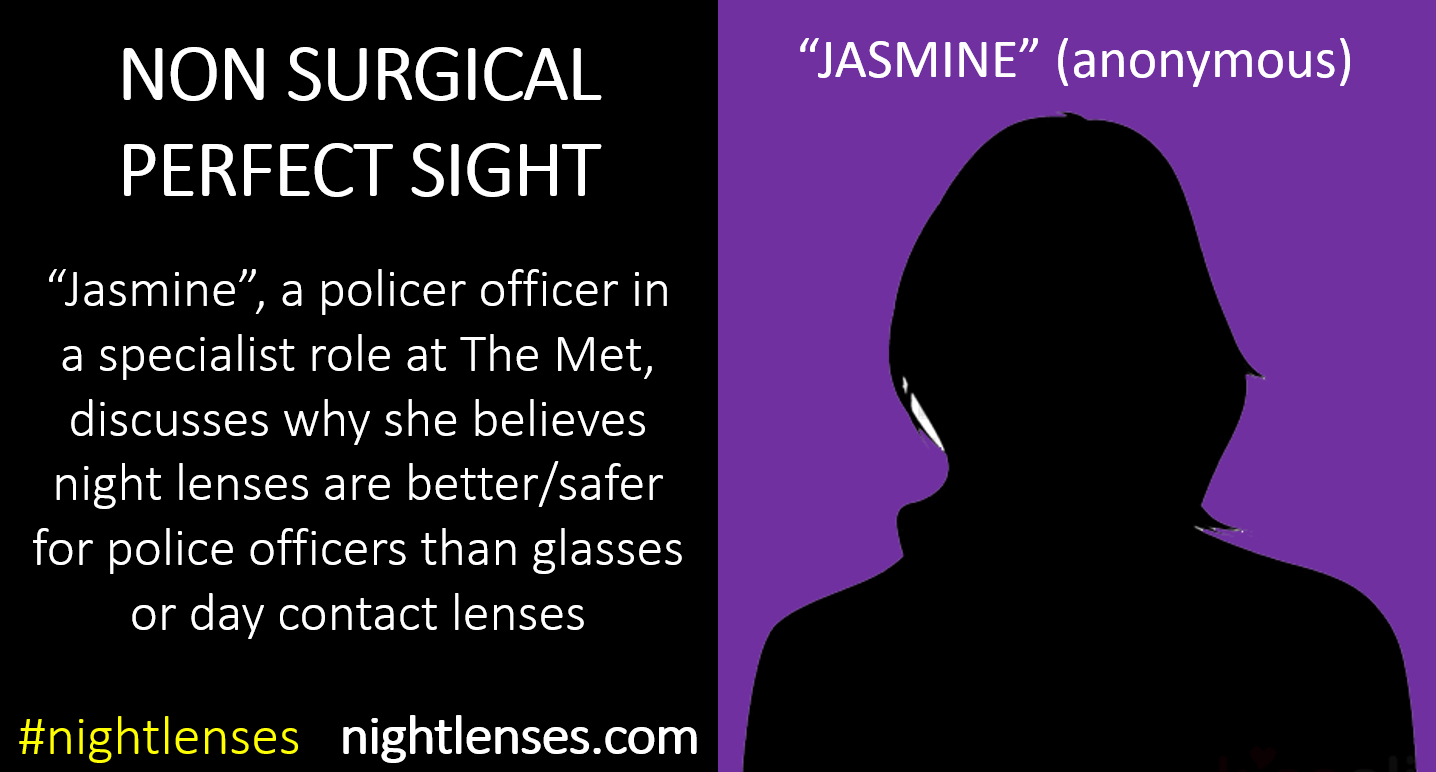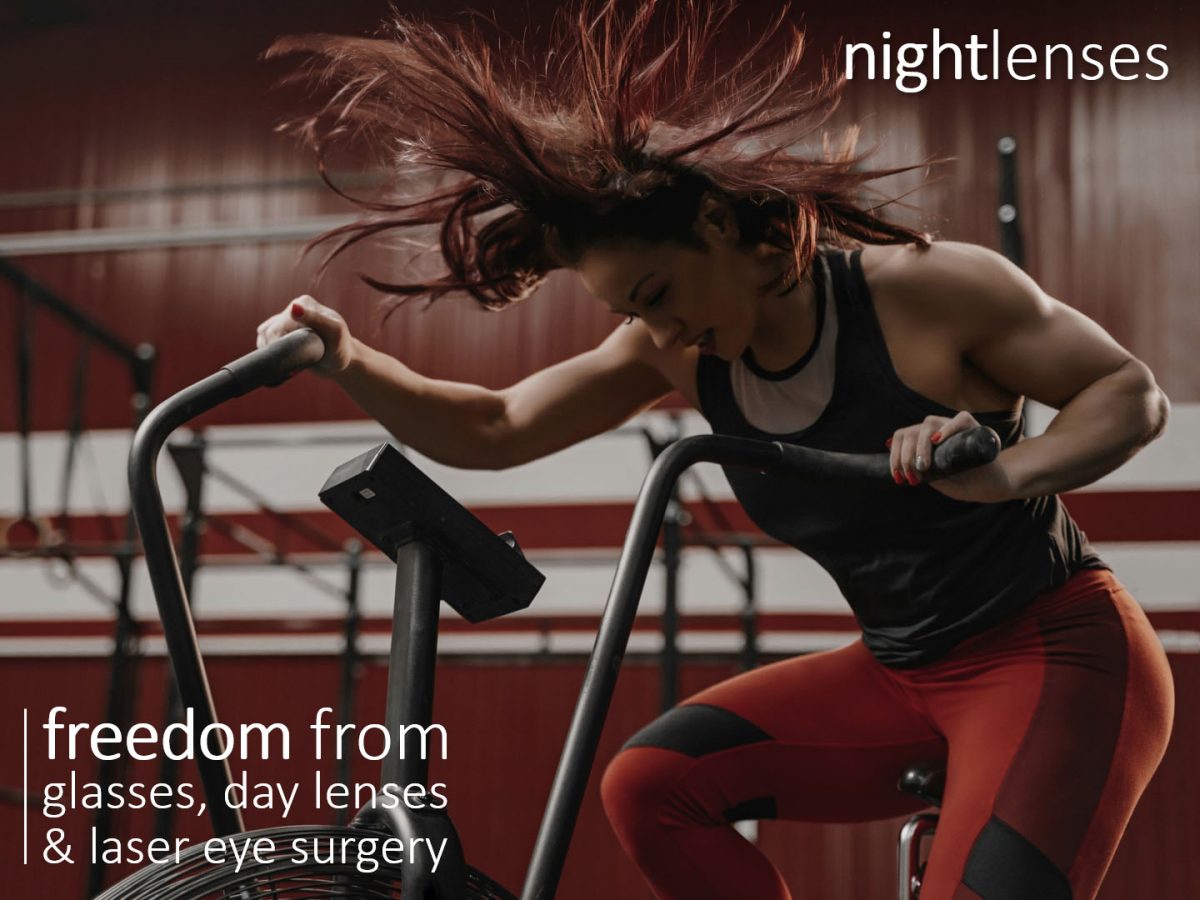Part 1: We caught up with Officer “John” (keeping it hush-hush), a 47-year-old legend who rocked the front line with TSG in Northern Ireland for a solid 13 years. John recently got fitted with night lenses, and let me tell you, they’ve turned his world around. He wishes he’d known about them earlier, both for work and kickin’ back at home. According to John, police work is a breeze – safer and better – with night lenses compared to the daytime alternatives. Check out John’s interview HERE.
Part 2: We dug deeper into the night lens experience with “Jasmine” (not her real name), also rocking it as a police officer in a specialist role with The Met. The transcript of her chat is below, or you can catch the full interview on YouTube HERE.

Absolutely. Back in my teenage years, I got the news that I needed glasses, and I wasn’t thrilled about it. So, at 16, I made the shift to contact lenses. When I turned 18, I joined The Met, and by 21, I opted for laser eye surgery. For about 12 to 13 years, my vision was on point. But as it started slipping, I found myself at a crossroads – go back to contact lenses or glasses? Enter night lenses. Honestly, I was a bit skeptical at first, not knowing much about them. However, the more I delved into it, the more it seemed like a solid option. The concept was straightforward – stick some lenses in before bedtime, sleep, and wake up with corrected vision. It seemed too good to be true, like a typo or error. Yet, pleasantly surprised, I found that by the morning, my vision was spot-on, just like wearing glasses or contact lenses, minus the eye gear! It’s fantastic not having to deal with either and still enjoying perfect vision all day.
Given your shift work, did night lenses raise concerns for you?
Not at all. If I’m pulling night duty and crashing during the day, I pop in my night lenses. As soon as I wake up, they come out, and I’m set with perfect vision through the night. Regardless of the shift, as long as I wear them during my sleep – a minimum of 4 hours does the trick – that’s enough for a full day’s worth of clear vision. It usually takes a day and a half before I realize I need to put them back in. The game-changer is going to work every day without worrying about my contact lenses potentially falling out. Especially during prolonged periods, as many police officers can relate, when you think you’re wrapping up, and then a last-minute call or an extended duty happens – before you know it, you’ve done a 20, 24-hour stint. When tired, eyes dry, constant blinking – it’s a relief not having to fret about that or reach for eye drops. Discovering night lenses has been a real blessing.
In our chat with another police officer, we called him ‘John’ from TSG in Belfast, who started night lenses in his late 40s, he was very active operationally. He echoed the same sentiment – in the midst of a lengthy shift, his lenses would get itchy and dry. Looking back, he agreed that having perfect sight with nothing in his eyes would have been a bonus. Let’s dive into your operational role. You mentioned two parts – the operational side in the earlier days and then the specialist role. Reflecting on the operational side, where CS gas might come into play – if you had night lenses instead of day lenses, would things have been smoother and better?
Absolutely, I’d recommend anyone considering day contact lenses to go for night lenses. If we had to use CS spray or PAVA nowadays, not worrying about the aftermath is a game-changer. While some might handle it fine, for me, it affected me as much as the person I was dealing with. Knowing you don’t have anything in your eyes that can add to the irritation is comforting. Given the choice, I’d go for night lenses over day contact lenses because you’re aware that PAVA can impact your contact lenses afterward.

Absolutely. I’m into HIIT and circuit training, both pretty high-impact. The best part is knowing I can go all out without fretting about losing my contact lenses, with the added worry of them hitting the floor if they fall out. Night lenses are perfect for high-impact activities. When it comes to swimming, I’ve got a little one, and with night lenses, I can stick my head underwater without stressing about what’s happening or if my lens has decided to take a plunge. No need to worry about checking the clock either. Everything is clear and crisp, just as expected, without the hassle of contact lenses or glasses. I’ve been rocking night lenses for about seven years now, and I wouldn’t trade them for day lenses. If I’d known about them before my laser eye surgery, I probably would’ve opted for night lenses first. Many people believe laser lasts for decades, so you don’t need to think about it until your 40s or 50s. Realizing I had to explore alternatives less than 15 years later, knowing what I know now, I would’ve gone for night lenses first.
It’s great to talk to someone who’s been through both laser and night lenses. Many think laser surgery is a one-time permanent fix, but that’s not always the case. There are risks and potential issues like floaters, making people wary. Your experience with both is intriguing. So, are you suggesting that for those considering laser, night lenses are a good way to transition to a glasses and contact lens-free life, see how it goes, and laser can be an option down the line?
Exactly! There’s always the option of laser later on. Another aspect I appreciate is that my prescription hasn’t changed over the years; it’s been consistent for the past seven years. Night lenses have kept my eyes steady, unlike Lasik, where I was slowly deteriorating. If you’re not keen on surgeries or find laser a significant commitment, give night lenses a shot as a good alternative. I wish I’d known about them earlier.
Before this interview, we discussed the term ‘myopia.’ I dropped the bomb that you have myopia! [Jasmine laughs] For those unaware, myopia, or ‘short-sightedness,’ is directly linked to eye diseases, detached retinas, and more. First off, do you think colleagues with short-sightedness should learn that term and understand it? Secondly, as a parent with myopia, the chances of your child having it are higher. Is this something you should consider and learn about for your child?
Absolutely! Honestly, at big-name places on the high street, it’s often termed ‘short-sight’ and ‘long-sight.’ Nobody talks about myopia. I didn’t know about myopia, but I do now. Short-sight is often downplayed, making it seem not too serious and fixable with contacts or glasses. However, realizing it worsens over time and can lead to eye diseases, I’ve become more cautious. It’s better to stay on top of this rather than take a relaxed approach. There might be an underlying health issue that needs attention. With night lenses, I’ve been going to my independent optometrist annually, getting extra check-ups that reveal any changes or issues in the back of my eyes. You might not get the same level of check-ups at bigger high street chains – I know I didn’t get them there, but I do here. It’s nice to make comparisons and say, “This is consistent for me,” or “There’s something here that needs further medical attention.”
Let’s give a quick shoutout to Jaimin Patel, your optometrist at Vision Eyecare, who’s an excellent example of a fantastic independent optometrist spending the time on this. Jasmine, we’re similar ages, and we need basic info to understand our options and what’s happening to our eyes as we age. This is why I’d encourage all short-sighted people to ask for a MyopiaChat next time they visit their optician.
Final question in two parts – first, would you recommend night lenses? [I think we know the answer!]. Secondly, similar to our chat with ‘John’ from TSG, is it safer for police officers fitting night lenses (less than -6D) to use them rather than day lenses for their role?
Absolutely, I’d recommend night lenses. The reasons and examples come from my 13 years of operational and frontline policing. For instance, in confrontational situations, you’re not thinking, “If I get punched, is my contact lens going to fly out?” If you’re using PAVA or another option, knowing how badly it will affect you if you react is crucial. For extended tour duties, if you’re wearing daily lenses, even though they’ve come a long way, after 18 – 20 hours, you start feeling the effects – dry eyes, thinking, “I need drops.” Not having to stress about dry or itchy eyes, or constantly blinking due to fatigue, is refreshing. For these reasons, I’d say definitely give night lenses a try. Jaimin, my optometrist, was excellent. It took time to get it right for me because they’re individual for everyone [Note: all night lenses are custom-made, no two are the same, not mass-produced]. Once he got them right for me, I’m glad I did it because I’ve had years of perfect vision, going about my business without worrying about glasses. I can do anything, go from here to the sauna or steam room without worrying about taking off my glasses, because I can see. It doesn’t impact my personal, social, or work life. It’s a good balance for me.
Absolutely! I mentioned to you before this interview that my teenage son’s life was completely changed by night lenses, which is why I spend my time doing these interviews and spreading the word. He’s 17 now, a surfer! Without night lenses stabilizing his myopia, he might have progressed to -6 or -7, and he wouldn’t be able to see the waves without glasses or contacts. Now he surfs with confidence, so I agree that night lenses are fantastic!
Thank you so much for your time and sharing your story; we really appreciate it.
Further info
